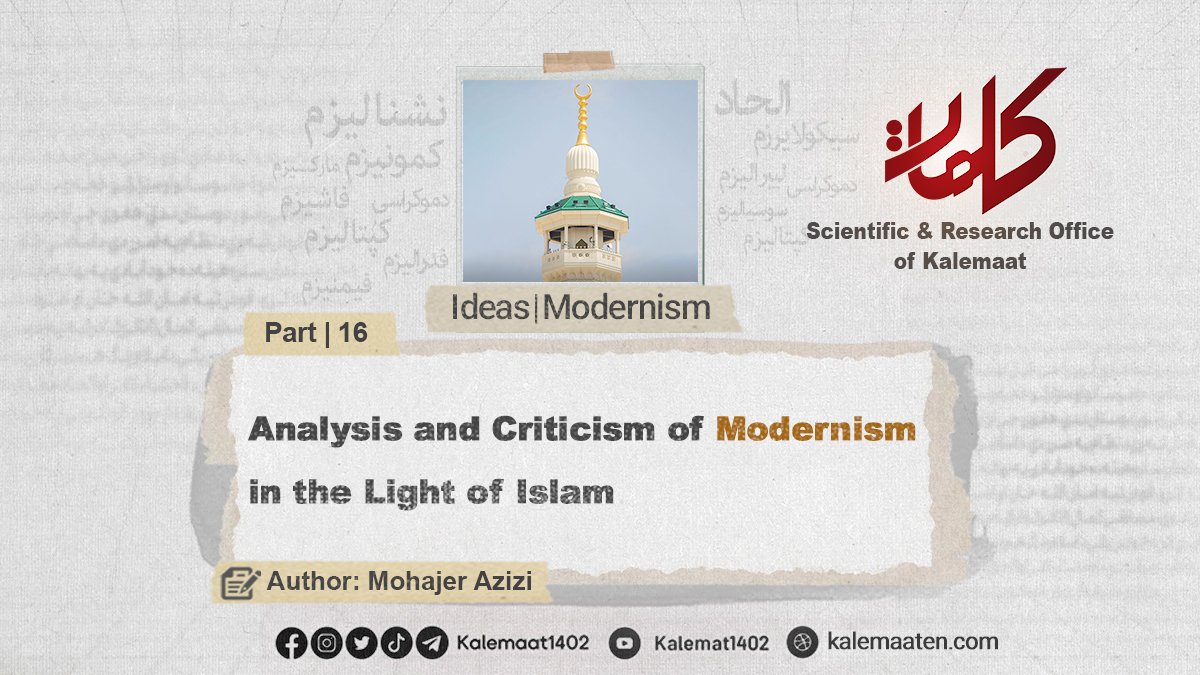Author: Mohajer Azizi
Analysis and Criticism of Modernism in the Light of Islam (Part 16)
-
Prominent figures of modernism in the Arab world
In the following, we introduce the important and prominent figures of Arab poets and writers who have played a very special role in the expansion and promotion of modernist thought in the Arab world:
-
Youssef al-Khal: A Syrian Christian poet and one of the main founders of the free and modern Arabic poetry movement. He played an important and special role in promoting modern Arabic literature.
-
Adonis (Ali Ahmed Saeed): A Syrian poet and the most important promoter of the modernist school in the Arab world. He severely attacked and desecrated Islamic history, religion, and morality, and even openly called for hostility to Allah Almighty in his university thesis titled “Al-Thabet wa Al-Motahavel,” which he wrote for his doctorate at Saint Joseph University in Lebanon. His fame is owed more than anything to the corrupt media that shed light on his strange and norm-breaking statements.
-
Dr. Abdulaziz Al-Maqaleh: Yemeni writer and poet, who was the president of Sana’a University. He is also one of the innovators of free poetry and modern Arabic literature in the Arab world. Among his important works are “the incurable Sana’a and readings in contemporary Yemeni literature”.
-
Abdullah Al-Arawi: A thinker, historian, and extraordinary writer, and one of the modern intellectuals of Morocco and the Arab world. He tried to find a way out of backwardness, and progress in the field of civilization and progress for the Arab world by relying on the concepts of modern humanities, especially from a Marxist perspective. He was influenced by Marxist and secularist thought and tried to promote modernism in Arab society through historicism, rationalism, and secularism.
-
Muhammad Abed Al-Jaberi: A Moroccan philosopher, thinker, and intellectual. He was active and played an important role in the fields of philosophy, epistemology, Islamic thought, and criticism of Arab intellect. He said that the Arab intellect, which throughout history has been mostly limited to mysticism, should move towards a demonstrative and argumentative intellect. Among his works are “We and Heritage, Heritage and Modernity, and an Introduction to the Holy Quran.”
-
Abdul Wahab Al-Bayati: He is considered one of the famous and contemporary Arab poets. He played a prominent role in the modernization of Arabic poetry. He was among the first to abandon and break the classical form of Arabic poetry and then turn to new poetry. Books such as: “Death in life, birds without wings, Al-Hallaj and…” are among his important and famous works.
-
Mahmoud Darwish: He is considered one of the greatest contemporary Arab poets. He was the voice of the Palestinian resistance poetry. He was one of the pioneers of new poetry. He was a poet who universalized the suffering of Palestine and revived love in the heart of the resistance. His important works include: “register! I am an Arab…, a memory of forgetfulness and…”.
-
Kateb Yassin: He was a famous Algerian writer, poet, and playwright. He is one of the important figures of resistance literature in the Arab world and North Africa. He wrote a work to defend the homeland and criticize and reject colonialism, and for this reason he is known as one of the brave and resistant people among the people. His most important work was “Nadida”, which is considered one of the masterpieces of modern Algerian literature.
-
Mohamed Arkoun: He was a French-Algerian thinker, Islamic scholar, and university professor. He tried to create a bridge between the Islamic world and modern Western thought. “This bridge will never be created, and there is no possibility of comparing them.” His works include the book Critique of Islamic intellect, Islamic Thought: A Scientific Reading, and Islam: Authenticity, Practice, and…
-
Salah Abdul Sabour: He was an Egyptian poet and intellectual. He is considered one of the pioneers of new poetry. He left a special impact on modern Arab literature. He was among the first Egyptian poets to experiment with free verse (without traditional meter and rhyme). His famous works include “The people of my country, the dreams of the old knight, Layla and Majnun and…”.
There are many advocates of modernism in the Arab world, to the extent that there is almost no Arab country where there are not dozens of modernists. They have accepted the idea of modernism and have promoted and propagated it in various ways.
If we look carefully at these advocators, we can divide them into two groups:
-
Thinkers and theorists
This group lived with the idea of modernism for many years, their souls and minds were filled with it and they believed in it. Their main concern was to spread modernism and establish its theoretical foundations. [1]
-
Superficial and deceived followers
This group has weak faith and is afraid of their future. Their hearts and thoughts are empty of solid religious and spiritual beliefs. As a result, they live in psychological distress and impasse and struggle with spiritual deficiencies and complexes. To escape this distress and feeling of alienation, they chose the path of opposing traditions, rebelling against habits and heritage of the past. They saw this method as the easiest way to become famous, to become prominent, and to fill their psychological voids. Modernism was for them the simple and accessible ship.
The leaders of modernism also took advantage of this situation and lured them with flashy titles: “future-making youth,” “cultural elite,” “new bourgeois intellectuals,” and the like. These deceptive praises captivated those unsuspecting followers to the point where they would mindlessly repeat every word and thought they heard from their masters—even if it was against their beliefs, the law, or political and social principles. [2]
Continues…
Previous Part / Next Part
References:
- Encyclopedia of Contemporary Thought, Vol. 2, p. 28.
- Ibid, Vol. 2, p. 28.



